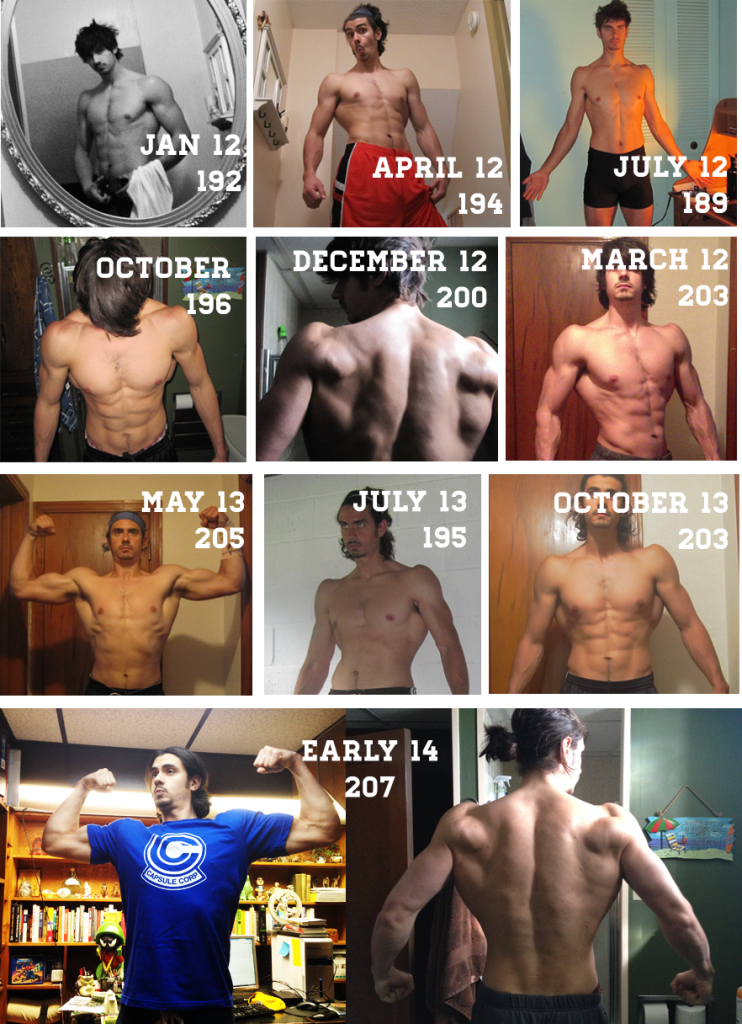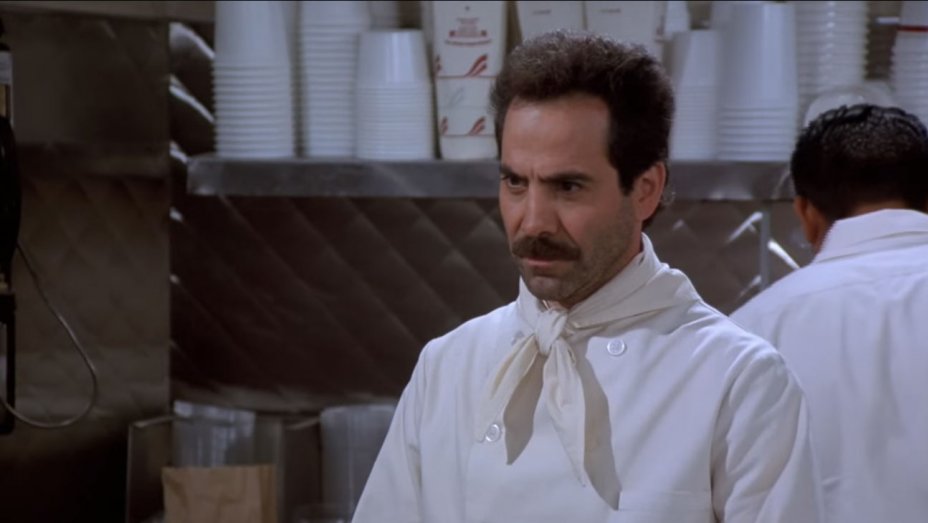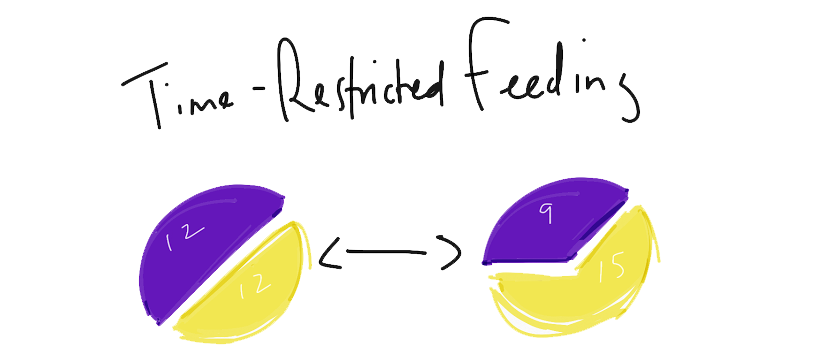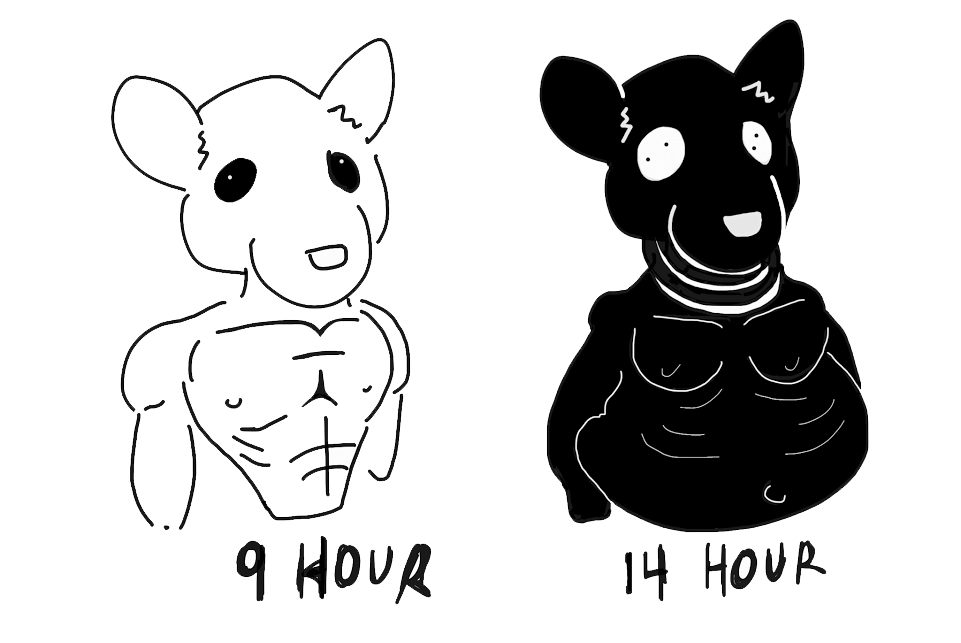If Jesus told me that I’d build the best physique of my life eating only two meals per day, I wouldn’t have believed him. I couldn’t have believed him. With all of the mainstream diet wisdom floating through the ether… MUSCLE WILL MELT IF YOU DON’T EAT EVERY SIX MILLISECONDS. TAKE THIS SUPPLEMENT WITHIN 30 SECONDS AFTER [...]
If Jesus told me that I’d build the best physique of my life eating only two meals per day, I wouldn’t have believed him.
I couldn’t have believed him. With all of the mainstream diet wisdom floating through the ether…
MUSCLE WILL MELT IF YOU DON’T EAT EVERY SIX MILLISECONDS.
TAKE THIS SUPPLEMENT WITHIN 30 SECONDS AFTER YOU TRAIN, OTHERWISE YOUR BODY WILL TOTALLY FORGET THE TWO HOURS OF RAGE IT JUST EXPERIENCED.
…how could it be possible?
I should have more faith in Jesus because I’ve been able to lose fat (while staying muscular) and gain muscle (while staying lean) eating minimal meals per day.

If you want to look better (naked) and you’re browsing the Internets for info on how to lose fat and build muscle, you’re bound to stumble upon intermittent fasting (IF).
I started intermittent fasting in 2011. And I’ve since been in control of my body composition more than ever before.
Now…
I’m no idiot (a debatable statement, yes). There are many reasons why I’m more in control. I’m not pinning all of my progress on the shoulder’s of intermittent fasting, nor am I saying intermittent fasting is right for everyone.
Intermittent fasting has giveth. I’m no longer a little bitch when it comes to hunger.
Intermittent fasting has taketh. I’m empty inside when I only get to eat two cheeseburgers (and not five).
There are many things you need to know before you begin intermittent fasting, but perhaps the biggest ones are
Knowing what “intermittent fasting” is and isn’t
and
Knowing what “intermittent fasting” does and doesn’t do
which is a silly sounding thing. But I get asked a lot of intermittent fasting questions…that make me want to (go) club(bing) (with) a baby seal.

“I started intermittent fasting, when will I start losing fat?”
effrhqrthbsqthnrqfbrshqt
In order to talk about intermittent fasting with a semblance of intelligence, we have to build a better model of intermittent fasting.
So let’s start at the beginning (as the King once recommended) and ask, “What the heck is intermittent fasting?”
Intermittent fasting confusion
Most people confuse “intermittent fasting” with one specific IF strategy — Leangains being (perhaps) the most popular IF strategy in the body composition space.
Leangains is the brainchild of Martin Berkhan, and Berkhan is the man that popped my intermittent fasting cherry. But Leangains is an example of intermittent fasting, much like a heart is an example of a bodily organ.
Your doctor says, “There’s something wrong with your bodily organ, we have to operate.” Uhhh, WHAT SPECIFIC ORGAN, DOC? Goober says, “I’m using intermittent fasting.” Uhhh, WHAT SPECIFIC STRATEGY, SIR?
To clear this up, I’m going to go broad before I go narrow — a decision that’ll prove to be semantically futile, which is exactly why it needs done.
Defining intermittent fasting
Look at teh Gewghoul definitions of each word.
Intermittent: occurring at irregular intervals; not continuous or steady.
Fast: abstain from all or some kinds of food or drink, especially as a religious observance.
Fasting is all about avoidance, with the pinnacle being no food and no drink for a certain period of time. This is the most clear way to define fasting: no soup for you, you get nothing.

(absolutes are fun)
Most intermittent fasting plans aren’t Soup Nazi strict. Leangains allows zero calorie beverages like water, coffee, and tea. Ori Hofmekler (often considered the grandfather of intermittent fasting) even allows some foods.
(Told you this wouldn’t be easy.)
The word “fast” is too ambiguous. I stop eating Doritos and say I’m fasting from Doritos. Started my fast yesterday bruh, no orange fingers for me anymore.
Add the ambiguity of the word “fasting” with the ambiguity of the word “intermittent” and here’s the sticky child that squeezes out from between their legs:
Intermittent fasting is the sporadic avoidance of food or drink.
That’s about all you can deduce, Sherlock. Sometimes I don’t eat or drink certain things.
Saying “I do intermittent fasting” is like saying “I play a sport.” It says something, but not much. (Especially if you consider bowling and darts to be sport.)
So don’t be one of those goobers that says, “I started intermittent fasting and I have a couple of questions…” You have to be more specific, okay? MORE SPECIFIC <<<!>>>
OTHERWISE IT’S SEMANTIC SUICIDE.
(did i prove my point? capitalized words always win.)
Intermittent fasting is a feeding framework based around purposeful and sporadic elimination. That’s all. Okay. Good. Got it?
If you want to get more specific, you have to be talking about a specific intermittent fasting strategy.
Magic of intermittent fasting, uno
So what’s all the hubbub? Does intermittent fasting have magical properties that help you look good naked?
Maybe.
But, first, let’s look at some superficial benefits of intermittent fasting.
Intermittent fasting and behavior change
Intermittent fasting can reduce your calorie intake and be a breath of behavioral fresh air.
Think of most diets. Change this. Adjust that. Avoid this. Add that. It’s behavioral suicide. Flip every food variable you’ve been used to since forever upside down. No big deal. One of the reasons most diets fail :::: behavior change is hard.
Now imagine this:
I want you to skip breakfast on Monday, Wednesday, and Friday. Make no other adjustments. Don’t compensate and eat more the night before. Don’t compensate and eat more during your lunch after. Just wake up and don’t eat breakfast on those three days.
(Not saying this is the incarnation of most intermittent fasting schemes [or any one specific one]. Just a hypothetical.)
Suddenly you’re cutting a chunk of energy you’re used to gobbling up and all you have to do is become anorexic and not eat go without breakfast a few times per week.
Intermittent fasting and lifestyle ease
For the past ten years, the dominant belief system within fitness: you need to eat smaller, more frequent meals to “stoke the metabolic fire” and keep your metabolism running high.
Smaller frequent meals requires some lifestyle adjustments.
You have to prepare your food in advanced. Not many people can cook six different times in one day.
You have to think about different kinds of meals, unless you have (or build) a palate that allows you to eat the same thing for multiple meals every day.
>>>> I have said numb palate. I built it. People are sissies when it comes to changing their palate. Am I being too nice here? ANGER. Probably not. I think the people “naturally” lean are those that actually listen to their palate and don’t self-sabotage themselves with mindless eating. (For more on mindless eating, see this. I talk about mindless eating and the effects of nutrients and flavor on satiety inside of this, if you want to take the dive.) <<<<
You have to transport your food. You need Tupperware.
It was a lot of work.
But what if you didn’t have to eat six meals? What if eating two or three meals had the same effect as eating six or eight meals?
You no longer have to prepare meals as if the apocalypse were upon civilization. You don’t have to turn into Emeril Lagasse to keep your palate happy. You don’t have to strap Tupperware to your body like a suicide bomber.

Intermittent fasting lends itself to behavioral, cognitive, and lifestyle ease. It’s a breath of fresh air compared to eating nineteen meals.
The pendulum has swung. Pendulum swings tend to sway the masses.
Magic of intermittent fasting, dos
Most people try intermittent fasting for reasons more complicated than “it’s a lot easier to skip a meal a few times a week than it is to change my entire life” which isn’t surprising, and not just because intermittent fasting seems like Anorexia Lite™.
Humans like to complicate. I complicate. Make me sound smart. Please. All I want is sound smart. All I want to do is become a cog in the same system I’m revolting against. Sponsor me. Photoshoots. All I want is. I don’t care about anything.
Most intermittent fasting strategies look to achieve what’s known as the “fasted state.”
Reaching the fasted state
You technically begin fasting the moment you stop eating or drinking whatever you’re fasting from (deep dish chocolate chop cookie sundae), but you won’t hit a fasted state until much later.
Consider the fasted state to be the point where all of your food is digested and your body is forced to use it’s own stash of internal materials (like body fat) to keep you ticking and tocking.
The fasted state opposes the fed state, the latter being when your body is undergoing digestion and processing food. The fed state (and the proceeding post-absorptive state that I’m conveniently overlooking in order to avoid barraging you with unnecessary photons) lasts around 12 hours.
This is why most intermittent fasting plans have a “fasting window” that is at least 12 hours long. It usually works its way to up to 16, 20, and 24+ hours.
Opposing the fasting window is the “feeding window.” If your fasting window is 12 hours, your feeding window is 12 hours. Because, this.

Leangains is often referred to as 16/8 intermittent fasting because the fasting window lasts for 16 hours and the feeding window lasts for 8 hours.
When these windows occur within the day aren’t always set in stone. An 8 hour feeding window can be from 10AM to 6PM or from 1PM to 9PM, but the specific window itself is held consistent on a day-to-day basis.
Days per week can also vary. Some people use intermittent fasting every single day. Others use it a few times per week.
/run/semantic-suicide.exe
What happens in the fasted state?
So you do your fast for 12-16-24 hours, and you reach the fasted state. From a mile high view, the fasted state is fat loss magic.
Your body uses fat to fuel low intensity activities. So when you’re done digesting and absorbing food, you’re using mostly body fat to fuel low intensity body movements.
Meaning if you sleep for eight hours, wake up and don’t eat or drink anything save for water for another eight hours, you can bet your body is using fat for fuel.
Also, extended fasts kick you into a state of ketosis. I talked about your body above, but now we’re talking about your brain.
Your brain’s primary fuel source is liver glycogen, which is stored sugar. If you fast, your liver glycogen gets all used up, which forces you brain to break down body fat into ketones for fuel. This is known as ketosis.
sciencesciencesciencesciencesciencesciencesciencesciencesciencesciencesciencesciencesciencesciencesciencesciencesciencesciencesciencesciencesciencesciencesciencesciencesciencesciencesciencescience.
Most intermittent fasting plans won’t have you swimming in the deep waters of ketosis (fasting window isn’t long enough), but KNOWLEDGE IS POWAHAHHAHAHAHAHA.
Your body isn’t a fan of fads
OH WOWWW THE FASTED STATE IS MAGICAL WOW YES YES YES>!eqewfwe (did i just subconsciously write “queef” in there…?)
The fasted state is magical, as it increases your odds of fat burning. With no incoming food, your body is forced to rely on what it has stored inside.
But here’s what most people miss…
What the body does one second can be undone not long after. You can fast for a day, use up some body fat, and then put back everything you lost (and more) in the day(s) to follow.
It’s like going to the casino and gambling away $500 in cash. You lost money in the short-term. But if you stay at the casino and win $700, then you’re up $200 and in a surplus in the long-term.
This is why intermittent fasting is a vehicle, not a direction. It can take you anywhere you want to go. It doesn’t inherently determine a location.
You can lose fat with intermittent fasting. You can build muscle with intermittent fasting. You can lose fat and build muscle at the same time with intermittent fasting.
/run/semantic-suicide.exe
/run/suicide.exe
You can do all of these things without intermittent fasting, too. (Especially if you take steroids!)
Magic of intermittent fasting, tres
Intermittent fasting sounds pretty shitty right now. Behavioral, cognitive, lifestyle benefits. The damn pendulum pushing around the mindless masses? Is that really what this intermittent fasting is all about?
Let’s see…
One intermittent fasting strategy is known as Time-Restricted Feeding (TRF). Time-Restricted Feeding’s dad is Dr. Satchin Panda.
Yes, Time-Restricted Feeding is all capitalized.
Yes, there’s a hyphen in the middle of “Time” and “Restricted” (for god knows what reason…maybe Mr. Panda wanted his strategy to be totally Internet unfriendly.)
Yes, I want my last name to be Panda.
Time-Restricted Feeding uses a 9-12 hour feeding window, which applies to anything but water. If you have a coffee, your feeding clock has begun. Time-Restricted Feeding is more on the Soup Nazi side of restriction.

The logic behind Time-Restricted Feeding = humans are diurnal creatures, and our body evolved to work with the natural rise and fall of the sun. EVERYTHING THE LIGHT TOUCHES IS OURS, SIMBA.
Every organ inside of us has its own clock. I’m now deleting the sixteen paragraphs I wrote about Time-Restricted Feeding because this isn’t about dissecting any one specific intermittent fasting strategy.
/run/hocus-focus.exe
Panda’s research shows that mice undergoing Time-Restricted Feeding decrease their fat mass and increase their muscle mass regardless of what food is being eaten.
In other words, you eat ice cream, pizza, and, of course, take your fish oil capsules. Because fish oil without the fish itself has to be a good idea, right guys? Reductionism has always been reliable within the biological interface.
In our universe, you eat all of this in a 9 hour span. In a parallel universe, you eat all of this in a 14 hour span. At the end of the day, you’ll be leaner and more muscular in our universe.
lolwut.

The reason why this happens isn’t quite understood. (Phenomenon > Phenomenology) If nothing else, it begins to debunk prevailing bodybuilder logic of muscles melting away if not fed every three hours.
Did you hear that Mickey? You don’t have to parade around Disney Land looking like schlub anymore. Just condense your feeding window, man. Minnie will love your new hawt bod.
Panda has data showing similar results in humans, but the mechanism is even less clear. Mice tend to eat the same amount regardless of feeding window length. Humans eat around 20% less if they condense their intake to the 9-12 hour window.
>>>>>
In Mindless Eating, Dr. Brian Wansink says that humans can eat 20% more or 20% less without knowing. Funny how the number pops up in two different (but related) situations.
THE UNIVERSE IS FIGUREOUTABLE. MATH. IT’S ALL MATH. KEEP GOING, GUYS. AHHHHHHhhhHhHhhhHHH.
<<<<<
There are more studies, including a “Leangains study.” You can read the findings of said study here. Follow the bread crumbs.
More human research will decide whether intermittent fasting is magical or mythical, which sounds like a terrible conclusion after coming this far.
But take solace in knowing the same thing can be said for 80% of the things we already accept as truth in the world. Anti-bacterial soap was banned, guys. IT DOESN’T WORK.
The (honest) empirical evidence is all I need. It has worked for me. It has worked for Berkhan (you be the judge). It has worked for many others.
No one can deny that there’s a physiological and metabolic shift that happens when you fast. The question is: what kind of an impact does it really have, and how big is said impact?
Magic of intermittent fasting, quatro
Fasting makes some people wet their willy in worry, but fasting has been around for a while. I referenced Ramadan earlier. Fasting is common in a lot of religions.
It’s also common in, uhhh, you. Right now. Intermittent fasting is built into your biology. For 6-9 hours (or however long you sleep), you don’t eat or drink anything. That’s where breakfast gets its name: you eat in the morning and break your fast.
Old school folks recommended fasting when sick. Not saying we should take medical advice from the BC era or anything, but they might have been onto something.
Everyone has a physician inside him or her; we just have to help it in its work. The natural healing force within each one of us is the greatest force in getting well. Our food should be our medicine. Our medicine should be our food. But to eat when you are sick is to feed your sickness.
–Hippocrates
Instead of using medicine, rather, fast a day.
–Plutarch
Some research ties fasting with (a) longevity and (b) cancer. bow chicka wow wow / wee ooh wim o weh
I don’t have the testicles to say intermittent fasting will help you live longer and prevent cancer. Rats aren’t humans. I don’t want you to find me and kill me if you get cancer.
I guess I don’t need to worry if you try intermittent fasting and subsequently die (from an unrelated cause), so I should be more vehement about intermittent fasting’s benefit to longevity. It’ll make me appear more credible.
I do, however, have the testicles to speculate why intermittent fasting may be beneficial for cancer and is definitely beneficial for longevity.
The process of breaking down and digesting food is stressful. It’s like giving Peter Gibbons a stack of TPS reports to file at the office.

If Gibbons is constantly filing papers, he can’t step back and take care of non-work related functions. He can’t clean his increasingly messy desk, he has to work late, which means he sleeps later, which means he wakes up groggy…
When you’re always eating, you’re always accumulating. The papers pile high. You never get a chance to clean. Fasting is a break from the work. You can take care of the mess.
The intermittent fasting finale
What is intermittent fasting? The sporadic avoidance of food or beverage.
Why is intermittent fasting special? It’s easier to manage from a behavior, cognitive, and lifestyle perspective. It (somehow) seems to make rats jacked.
It might help cancer. It will absolutely certainly definitely will help you live longer. (Please read the entire article if you haven’t.)
Maybe now you’re compelled by the mountain of aforementioned research on mice and the two humans I mentioned (one of which being myself, surely free from any and all biases) that’ve lost fat and built muscle using intermittent fasting.
(Or maybe you just broke your foot and can’t cook.)
You want to give it a go.
Do I recommend intermittent fasting? Maybe.
There are some things you should know before you start intermittent fasting.
But if you’re ready to dive in, here’s an oldish article I wrote about my two meal per day strategy. And here’s a book I wrote about my intermittent fasting strategy, soup to nuts.